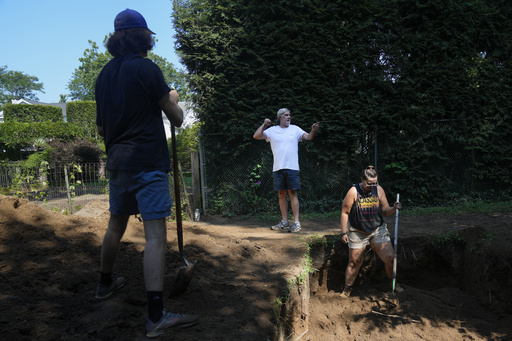
In Kingston, New York, college students participated in an archaeological project this summer, excavating a backyard that was once an African American cemetery. The site, now known as the Pine Street African Burial Ground, was a burial ground for enslaved individuals in the 1750s, located on the outskirts of town. The cemetery was eventually covered over as the city expanded, but recent efforts have led to the discovery of up to 27 sets of remains over the last three summers.
Advocates in Kingston have purchased a residential property that covers part of the old cemetery and have transformed the house on the site into a visitor center. Funds are being raised to convert the urban backyard into a proper memorial site. Tests will be conducted on the remains found to uncover information about the individuals buried there and potentially identify their descendants.
The cemetery, established in 1750 for enslaved individuals, continued burial practices until about 1878, with graves aligned so that the deceased would face the rising sun on Judgment Day. Remains discovered on the property are covered with African cloths and left in place, while those found on adjacent land are relocated for burial on the Harambee property.
Students from the State University of New York at New Paltz have been participating in excavations at the site, aiming to shed light on the history of those buried in the cemetery and give them the respect they deserve. Plans are in place to raise funds for the transformation of the backyard into a memorial reflecting the African heritage of those interred there, including a prominent marker in the yard.
While some graves may have been marked, it remains a challenge to identify all those buried at the site. One intact headstone was found for Caezar Smith, a man born into slavery who died a free man in 1839. Research indicates two other potential individuals buried there: a man named Sam and a 16-year-old girl named Deyon, who was executed in 1803 for the murder of her enslavers’ daughter.
Similar efforts to rediscover forgotten African American cemeteries have taken place in various parts of the country, highlighting the importance of preserving and honoring these historical sites. The Pine Street African Burial Ground project in Kingston represents a significant step towards recognizing and respecting the individuals laid to rest there and connecting present-day communities with their heritage.
Researchers hope that analyses conducted on the remains will provide valuable insights into the lives of those buried at the site, potentially tracing their origins back to Africa and connecting them with their descendants. This endeavor not only seeks to uncover the lost history of these individuals but also aims to bridge the gap in African heritage and provide a sense of identity and connection for future generations.
